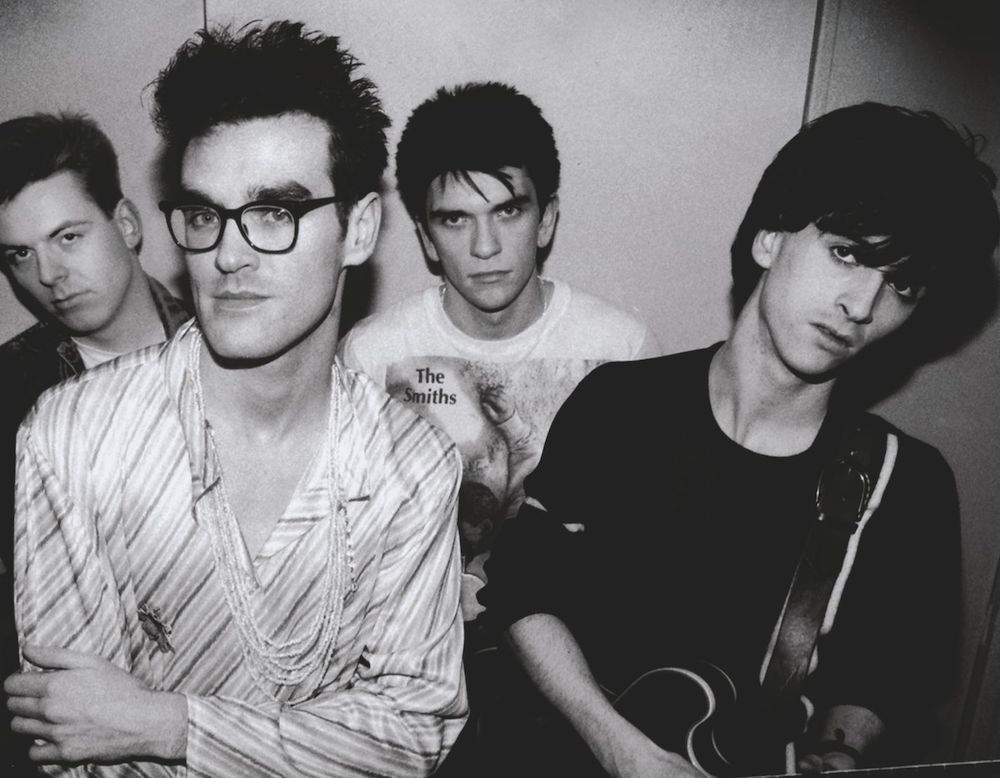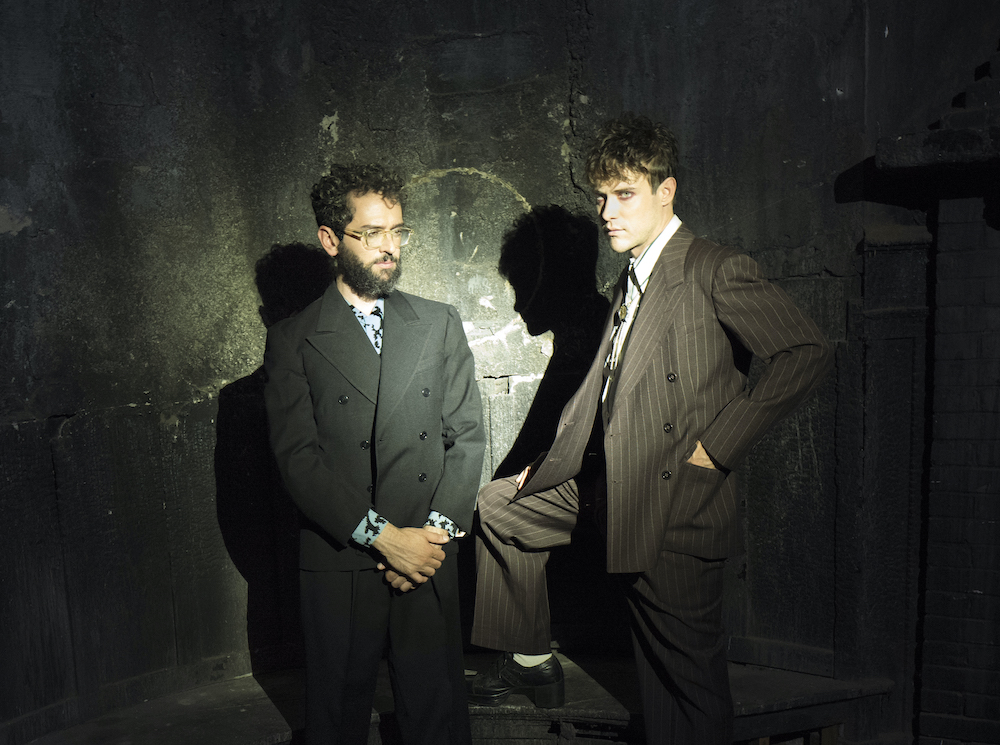We often perceive indie rock of the early 21st century through two defining lenses: the era of New York's early '00s retro-revival and the rise of Brooklyn and mainstream indie that supplanted it by the end of that decade. There were, of course, all sorts of other scenes in other places -- in orbit or influenced by the cultural signifier of Brooklyn's scene, or working as counter-narratives and parallel trajectories. One of those counter-narratives happened in Baltimore, which became an unlikely nexus for a young, artsy group of bands that often seemed to be operating adjacent to the mainstream indie narrative without ever fully joining it.
Several of these bands were known for being heady and melancholic, including Wye Oak but also Beach House and Lower Dens. Most of them made earnest, emotional music -- especially Future Islands, a later addition to the little scene. And all of them, even after a fluke breakthrough moment like Future Islands' or a steady prominence like Beach House's, felt like spiritual outsiders in their time.
It's been just over 10 years since Wye Oak first appeared -- then, and always, the duo of singer/guitarist Jenn Wasner and drummer/keyboardist Andy Stack. They released their debut If Children in 2007 -- it was re-released when they signed to Merge in 2008 -- and have felt like the outsiders of the the outsiders ever since, despite sharing some stylistic DNA with their peers. For a long time, it seemed like nobody knew how to talk about this band. They've been compared to Neil Young and Dinosaur Jr. and Yo La Tengo; they've been called "shoegaze folk" and slowcore. You could see them having existed in the '90s indie landscape, but you could also say that their sound is without a traceable place and time.
This is partially the result of hindsight, knowing how Wye Oak mutated and blossomed across those years and across five full-length albums (and the crucial footnote of "non-album" Tween.) For a few years, there was one thing people decided about Wye Oak: In an era when, as they say, the rock idiom was supposedly always on the precipice of relevance or lack of originality, Wye Oak were one of the bands that managed to make impactful and intriguing guitar music. Maybe it was partially due to the fact that their antecedents were a little more unique or subtler compared to some of the other big indie names of the era, but there was a sense that Wye Oak was able to wrangle something foreign and exciting out of the tropes of the instrument.
(Going back through interviews with the band from the late '00s or as recently as the early '10s, it's striking how much the general cultural discourse has shifted. As Wye Oak first started to garner notoriety, there was sometimes an excitable tone that stumbled into "A woman that can shred!" type exclamations.)
This was the original version of Wye Oak, the one that began on If Children, grew into their own on 2009's The Knot, and peaked with their 2011 breakthrough Civilian. This was the version that utilized grunge-y quiet-loud swerves into volcanic, distorted choruses. The version that sought, for themselves and their listeners, to parse regret and the murk of a person's own sadness and memory with the aim of delivering catharsis at the end. On Civilian, they perfected that approach, and from that point there could be no stasis, no turning back.
When Shriek came out in 2014, plenty Wye Oak fans lamented the fact that the band was making such an abrupt left turn so soon after locating something very powerful in their sound. (All the same, it was one of our favorite albums of the year.)The initial talking point was that the guitars were gone. That came across as something nearly quaint -- what's the big deal with a rock band experimenting with synths in the 2010s? That isn't a narrative.
But what was true about the shift between those two albums was that Wye Oak tore up their entire songwriting process by the roots. They changed what instruments they focused on -- most notably, Wasner didessentially ditch the guitar in favor of bass as her lead instrument -- and accordingly upended how they brought songs into the world. Rather than sitting down with a guitar and jamming their way into something resembling a rock song, Shriek left the impression that Wasner and Stack had coaxed these compositions into being from the abstract worlds of production and synth wizardry.
The result was that everything sounded unfamiliar, but exhilarating -- like the duo's creative renewal and self-discovery was palpable in the songs. The melodies reached higher altitudes, the rhythms were more controlled and dancier, prominent bass gave the material a forward momentum as synths gave it a surreal and enveloping atmosphere. They sounded like a completely different band, and yet all that means is that they sounded like Wye Oak.
"I wanted to set a precedent that Wye Oak could be whatever we wanted it to be," Wasner told me in 2016 by way of reflecting on Shriek and previewing the then-impending surprise release of Tween. "Now that that's the case, I feel free enough within the confines of this project that I can do anything I want to do."
At one point, Wye Oak came across like a surprisingly compelling rock duo. Over the years, they've warped that. But the Wye Oak of Civilian? That still exists. So does the Wye Oak of Shriek. These disparate corners somehow manage not only to co-exist, but to inform and re-shape each other as time passes -- the story you've been watching in real time beginning to come into focus. Those are the foundations of great bodies of work in pop music; Wye Oak might've been simply following their muse, but that's what they've been building.
Which brings us to their new album The Louder I Call, The Faster It Runs. As Tween hinted two years ago, the band was heading someplace unmoored from expectations relating to any of their past work, a place where they could pick and choose the sounds they wanted to chase. As Wasner had hoped and as Tom Breihan wrote in our Album Of The Week feature on The Louder I Call, they're a band that can now do whatever they want, and it feels like it will all make sense:
The Louder I Call, The Faster It Runs isn’t a defiant gesture the way that Shriek was; it doesn’t take a forceful left turn from the band’s old sound. It doesn’t have to. After Shriek, there’s no fixed Wye Oak sound. They don’t have to pivot away from anything in particular. The Louder I Call keeps the jittery, chirping synths of Shriek, but it doesn’t feel like an extension of that album. And it reintroduces Wasner’s flaring, crashing guitars, but it doesn’t feel like a return to the band’s Civilian sound, either. Instead, it’s a leap into the ether, an album that picks up sounds and ideas from gleaming pop and fuzzed-up indie rock without ever sounding like pop or indie rock or, for that matter, any other genre.
Wye Oak's identity has shifted radically over the years, but they managed to pull off the rare feat of making it come together into a logical body of work. In hindsight, you can see a progression that is adventurous but less abrasive and more cohesive than it might've felt initially. And in the same span of time, they've amassed one of the most consistently gratifying, enviable catalogs in modern indie music.
When you put together these sorts of retrospective lists, there's often an internal push and pull -- you want to honor and represent a holistic portrait of an artist's career, but there might be glaringly obvious high points, or personal favorite albums from which you'd select six of the 10 songs if you didn't hold yourself back. It isn't that way with Wye Oak. Taking in the whole of their catalog now, a little more than a decade in, all of their divergent forms have something to offer. Their best songs are spread out across the years. And their new sound, this ethereal hybrid they're chasing -- that's going to offer something totally new. But maybe what's best about it is the realization that Wye Oak already has so many great songs to their name already, and if the new chapter introduced by The Louder I Call is any indication, their actual best work may yet lie ahead.
10. “The Instrument” (from The Louder I Call, The Faster It Runs, 2018)
After living with The Louder I Call, The Faster It Runs for a little while, there are several standouts that could rival the high points of Wye Oak's preceding albums. There's the thrashing synth overload of "Symmetry," and the gentle maelstrom of "Say Hello." Over time, maybe those songs will edge out "The Instrument." But for now I'm going with "The Instrument," for a couple reasons. First, there's the basic fact that this is the new Wye Oak song that gets stuck in my head -- a lot. More importantly, it continues their tradition of strong opening tracks and immediately blankets you in the wiry yet lush atmospherics of The Louder I Call. That keening lead line, the skittering drums, all the burbling synths, Wasner's super-melismatic chorus -- it's all the things Wye Oak has always done well, updated for the gleaming-yet-enigmatic world of their new album.
9. "My Neighbor" (from the My Neighbor / My Creator EP, 2010)
Much of Wye Oak's guitar-centric phase relied on the strength of their dynamics, their ability to fill a song with pressure as it staggered forward until they deemed it time to let it rupture. "My Neighbor" -- the highlight and one of the title tracks from the EP that served as a bridge between The Knot and Civilian -- found them honing their craft and learning to deploy their energy in different formats. Up until this point, there had never been a Wye Oak song that rushed and careened forward quite like this. Built on a tumbling drum figure, quick bass runs, and churning guitar, the song all works as a percussive underpinning to Wasner's voice. It was an early example of Wye Oak learning to be more propulsive, and it remains one of their most sneakily catchy songs.
8. "The Tower" (from Shriek, 2014)
As the lead single for Shriek, "The Tower" worked as a perfect mission statement for Wye Oak's new identity. It's not as if groove wasn't always a factor in Wye Oak's music -- the combination of Wasner's guitar breaks and Stack's dynamic percussion meant that much of the payoff in older Wye Oak tracks was thanks to the rhythmic tension and release as much as guitar solo theatrics. But thanks to the songwriting overhaul of Shriek, the groove of songs like "The Tower" was a completely new approach for the duo.
All throbbing, heavy bass and string stab punctuations, "The Tower" was unlike anything that preceded it and it set the stage for all the different shapes Wye Oak could bend themselves into on Shriek (and on the two releases that have since followed it). There's a tense insistence to it, a mathematical lope that traps you in an unrelenting electronic current. And like many of Wye Oak's best songs, there's a contrast at play. That anxiously robotic groove gives the song its off-kilter dance vibe, and within there's Wasner's voice -- moody but calming, the reminder of a human presence remaining within the gloss and artificial colors of Shriek.
7. "Watching The Waiting" (from Tween, 2016)
There were older Wye Oak songs that achieved some sort of liftoff, but it was typically the product of a hard fought endeavor -- a dark and convulsing song yielding to a burst of emotion. A purge, but not necessarily clarity. That began to change on the searching Shriek, and when it came time for the band's non-album side-step Tween, you could start to see how they were arriving at this point. A collection of tracks lost in the shuffle of the sharp transformation between Civilian and Shriek, Tween filled the strange role of both connective tissue and a prediction.
"Watching The Waiting" was the new song of the group, and in many ways both the summation and the conclusion of the other seven tracks -- or, as Wasner said to Allston Pudding in 2016, it was Tween's "thesis statement."
The song has a gallop that Wye Oak had utilized before, but it takes off into a low-hanging soar almost immediately. Narratively, the song focuses on the idea of coming to terms with yourself and your life, acknowledging all the left turns you didn't expect but embracing the things that were out of your control and where they led you. "When I made my plan/ There were some things/ For which I could not account," are the opening lines. Wasner's vocal glides above a brisk instrumental that eventually gives way to an otherworldly solo -- the type of thing you can't quite identify as guitar or synth or something else entirely. All of it is in service of a headspace less common in Wye Oak's music. Here, there is resolution. Here, rather than simply fighting back the demons, Wasner located something resembling peace.
6. "The Louder I Call, The Faster It Runs" (from The Louder I Call, The Faster It Runs, 2018)
As the first preview and title track for their new LP, "The Louder I Call, The Faster It Runs" sets the stage for the next phase of Wye Oak. But representing the vibe of yet another excellent Wye Oak album isn't the only reason it ranks amongst their finest work. There's a vague, imperceptible quality to the song's title and refrain that sums up a large part of what Wye Oak are about in general. Here, they use the gurgling sound of a guitar made alien, hiccuping synth backdrops, and a pristinely layered vocal outro to convey a recurring thread of theirs: This is a group that is always seeking something just out of reach, just over the horizon. Almost there but not quite definable.
That's at the core of their music: the pangs of nostalgia, mourning for lost and forgotten things, the attempts to make sense of the past in order to crystallize who you are now. And it's also at the core of their identity as artists, restless and eager to emphasize that this is a project that will constantly shape-shift. In this one song, they reflect all of those feelings from the past, and establish a course for their future -- a course that could go just about anywhere.
5. "Hot As Day" (from Civilian, 2011)
There is an elusiveness to a lot of Wye Oak's music, born from the fact that so much of their work comes from an interior place. On Civilian, that could manifest in songs that felt like a beleaguered, nocturnal strain of dream-pop -- songs like opener "Two Small Deaths" or "Hot As Day," the song that kicks off the album's stunning final stretch. And like a lot of the best dream-pop, a song like "Hot As Day" uses a gradually unfolding melody, one that feels intentionally hard to grasp at first, to depict the unpredictable pathways of memory.
But the songs of Civilian, in particular amongst Wye Oak's work, lean on contrasts for their effect. "Hot As Day" stays true to its name and thrums like something on the verge of igniting in thick, suffocating humidity. It's driven by that simmering main guitar part until, finally, it explodes into flares of guitar distortion at its conclusion -- that catharsis that Wye Oak was always looking for, and often found, across Civilian.
About six and a half years ago, there was one evening where I rode a camel across the desert in the middle of China. I had a playlist for it, all the songs intended to parallel the experience of being a kid from small town Pennsylvania asking how exactly did I get here, in that moment. All songs that were meant to conjure up and soundtrack another world. "Hot As Day" was on that playlist, and I can't separate it from that experience. To me, it's one of Wye Oak's defining moments because it's one that brings you back to something and brings you someplace else you've never been at the same time. It's in that unique liminal space that all of their best work exists.
4. "Sight, Flight" (from The Knot, 2009)
There are a lot of standouts from Wye Oak's sophomore album. It's where their sound really started to click into place, a downcast and autumnal folk-rock that fully encompasses the listener in its mood. There was the lachrymose beauty of "Siamese" and "I Want For Nothing," both augmented with wistful string arrangements. There's "That I Do" and fan favorite "For Prayer," both perfect examples of how well Wasner and Stack could make a song lurch into violent, wild-eyed eruptions, the latter memorably climaxing with a moaning, aggrieved pedal steel solo.
You can pick out favorites from The Knot, but even more so than Wye Oak's subsequent albums -- all of which play very well front to back -- there's a way in which this one feels like a single, listless journey through the night. It works best when experienced in full, ending with its heartbreaking, bleary-eyed closer "Sight, Flight." Running its fingers along the fault lines of a relationship, "Sight, Flight" comes across like the reckoning at the end of that journey, the just-before-dawn epilogue of The Knot. It's a weary, haggard thing, not dissimilar from other Wye Oak songs of the era. But it's that ending, that weeping violin line that draws the song into the encroaching noise of its finale. It could sound like a fractured sunrise, or the final surrender at the end of a downcast album. Either way, it's one of the most beautiful pieces of music Wye Oak has ever put together.
3. "Spiral" (Adult Swim Single, 2012)
Looking back, "Spiral" was a signal. Like most of the material on Tween, this existed in the transition between Civilian and Shriek, the difference being this was actually released during that time and hinted something else could be afoot. It's hard to think of a song that could more perfectly sum up a middle ground between the two wildly dissimilar albums.
"Spiral" has all the same darkened blues and greens of Civilian, and it's still mostly a guitar song, mostly a rock song. But it is a strange rock song. It prefigures the complete shift of Shriek, but you can hear that sensibility invading the songwriting already.
Oscillating synth figures dance around a looping, hypnotic guitar part, building a trance that even the intensified beat of the chorus doesn't quite break. And then it drops you into a long, instrumental coda that's reminiscent of Steve Reich, of all people. It's fitting that Wye Oak released "Spiral" as a one-off Adult Swim single separate from their main body of work and yet have given it prominence in their catalog since by playing it frequently. This song remains completely singular for them, a dark and trippy mini-epic that shows a band willfully transforming themselves and finding a loose piece of genius in the process.
2. "Shriek" (from Shriek, 2014)
If Wye Oak's early rock albums felt like excavation, like using explosives to dig into the ground and find what was hiding, then Shriek was the moment they turned their eyes upward and redirected the search to the clouds. Some of their most beautiful songs were on that album, like opener "Before" and "School Of Eyes," songs that took synthetic psychedelia and made you feel as if you were walking just below the stratosphere. (It is, consequently, a fantastic airplane album.)
The aesthetic evolution of Shriek dovetailed with a redefined sense of purpose, as well. "I think a lot of my other music is about relating to other people, and this record’s very much about learning how to relate to and understand myself," Wasner told me in 2014. It's an album that takes place in a person's head, and in all the indecipherable places you can go without leaving it. For a band with plenty of ethereal tracks, Shriek's title track goes furthest in that direction. Its main synth line lures you in, a dream state that could be taking place deep underwater or floating far above ground. That lack of logic, that freedom of interpretation, makes it the manifesto and quintessential example of Wye Oak Part 2 --this is music no longer concerned with wrestling yourself into personal resolution, but music that sets off to discover the unforeseen wonders of the world outside.
1. "Civilian" (from Civilian, 2011)
If "Shriek" was the epitome of Wye Oak's reinvention, "Civilian" was the platonic ideal of a Wye Oak song during their first iteration. As the centerpiece and title track of Civilian, it was where all of that album's moods and themes collided. Using that line about "baby teeth" on her bedside table, Wasner uses concrete representations of being a pack rat as metaphors for a more emotional version of the same impulse -- "hanging on to things past the point of reason and being dependent on others, and unnecessarily and unrealistically hinged to your past and being afraid of change," as she put it at the time.
After Civilian, Wye Oak had to change. Not just because they toured that album ruthlessly and burnt themselves out on their existing music. Not just because the album represented the pinnacle of their achievements within their old sound. Because those concerns Wasner outlined were pivotal to early Wye Oak, and then they were purged across Civilian. It was time for new territory and new battles after that.
But on Civilian, those things did have to be purged, and the song "Civilian" is where the exorcism really happens. From a songwriting standpoint, "Civilian" is a masterpiece in controlling drama. That rolling guitar lead -- immediately memorable, and persisting throughout -- is one of those opening credits devices: You know you're in for something from that first moment, from the rising tension when the organ first hums to life, from Stack's thunderous drum entrance. Eventually, it all overflows into the biggest catharsis that this band ever achieved, a storm of in which there somehow feels like there is no separation between Wasner's ghostly moans and her frayed, roaring guitar. Like they are inextricably of the same being.
None of that, or the placement of "Civilian" in this position, is meant as a referendum on Wye Oak's explorations since. This song looms large for a lot of Wye Oak fans -- it is harrowing yet cleansing, it is the moment many of us first fell in love with this band. But like I said above, I'm not convinced this band has yet written their absolute, final, defining song. This is merely the one that defines part of their story, the one that burns everything down in order to start anew. Wye Oak needed to write this song. It opened the door for everything that came after, and everything that's still to come.
Listen to the playlist on Spotify.






